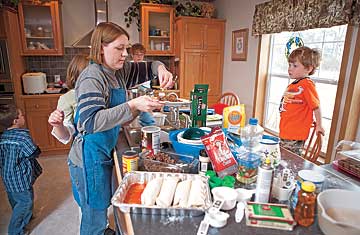
To cut costs, Linsey Knerl cooks a month's worth of food.
Linsey Knerl doesn't get out much anymore. A freelance copywriter and mother of four from Tekamah, Neb., Knerl has cut back on trips to the movie theater and restaurants as well as days at the zoo with her kids. Fun is now a DVD from Netflix or a family board-game night. She cooks at home most evenings and has hoarded six months' worth of meat in her freezer to reduce trips to the grocery store and save gas money. "We made a conscious decision that we couldn't go out to eat two or three times a week anymore," says Knerl, whose husband stays home to help raise their kids.
Start stockpiling your canned goods, America. We're quickly becoming a country of cocooners, to borrow a term that retail analysts use to describe consumers who nest at home to shave expenses. It's a profound reversal of the consumption habits that helped fuel the economic crisis in the first place. "It's about getting back to basics," says cocooner Stan McClain, who owns a studio-supplies store in Burbank, Calif., and has drastically cut back his restaurant spending and even tore up his driveway to turn it into a vegetable garden. "By going backward, you can actually go forward responsibly."
In an effort to discover what modern cocooners are lining their nests with, TIME asked data-tracking firm the Nielsen Co. to identify product categories whose sales are rising--and falling--at drugstores, supermarkets and big-box outlets. The findings indicate that we're staying home, cooking more and forsaking discretionary items. Unit sales of canning and freezing supplies like jars, bags and other containers were up 11.5% during the eight weeks ending Feb. 21, making them the second best performing category on Nielsen's list. ("Seasonal general merchandise," a catchall including road salt, body warmers and gift candy, rose 32%--a result of the brutal winter and a recession-related downsizing of Valentine's Day.) Baking supplies, dough products and flour all hit the top 20, as more people make brownies instead of buying them. (Knerl, for one, has started baking her own bread.) Wine and liquor were also up; misery may love company, but many seem content to self-medicate at home in this bleak economy.
Curiously, dollar sales of family-planning products, which include condoms and over-the-counter female contraceptives, were up 10.2% in the first two months of this year, although unit sales climbed only 1.5%. Cocooning can lead to canoodling, which can lead to ... recreation. "People are spending a lot less on entertainment," says brand consultant Rick Shea. "And that, for the most part, is free."
At the other end of the spectrum, sales of nonessentials are largely down. Bottled water dipped 11%, unsurprisingly. "What's the economical substitute for that?" asks Tom DeMott, chief operating officer of Encore Associates, a consumer-goods advisory firm. "It's called a tap." Film and cameras, whose sales dropped 31.5%, were the worst of the bunch. With entertainment and holiday travel down, people have fewer good times they want to remember (and if they're using all that contraception, there's less likelihood of baby snaps too). Housewares and garden items are slumping, as are air fresheners and deodorizers. "If you're lucky enough to have a couple of extra dollars, do you really need your bathroom to smell minty fresh?" asks Shea.
